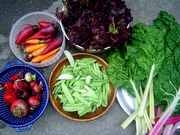

|
| Vegetable Varieties for Gardeners is a citizen science program
|
|
|
|
'Upland' Cress |
| |
| Sub-Category: |
None
|
| |
|
| Sub-Category 2: |
| | Description: |
6- to 8-inch rosettes of dark-green, glossy leaves. Slow growing and slow to bolt. Also known as winter cress or creasy greens.
|
| Days To Maturity: |
50
|
| Seed Sources: |
|
| |
| Rating Summary |
| |
Overall: (3.5 Stars)
Taste: (4.5 Stars)
Yield: (2.5 Stars)
Ease/Reliability: (3.0 Stars) |
| |
| Reviews |
| |
Login to share your Review of Upland.
Number of Reviews: 2
KEY: O=Overall Rating, T=Taste, Y=Yield, E=Ease
Reviewed on 09/26/2006 by
Sahale
- An experienced gardener
|
 Overall Overall
 Taste Taste
 Yield Yield
 Ease Ease
|
Seneca, New York, United States
Frost Free Season: 163 - 183 days
Soil Texture: Clay
Garden Size: Medium - 400 square feet to 1,600 square feet
Sun Exposure: More than 8 hours per day
|
| "Slow growing" is the key here. I'm used to plants in the mustard family being pretty vigorous, so this was a standout. The slow growth, flat rosette habit, and deeply lobed leaves made weed control challenging, which in turn got the few leaves pretty muddy. Plan on growing a lot and mulching to get enough to be worthwhile. On the plus side, a pretty plant with good flavor. |
| |
|
Reviewed on 06/13/2006 by
farmerdill
- An experienced gardener
|
 Overall Overall
 Taste Taste
 Yield Yield
 Ease Ease
|
Richmond, Georgia, United States
Frost Free Season: 183 - 203 days
Soil Texture: Sand
Garden Size: Large - More than 1,600 square feet (40' x 40')
Sun Exposure: More than 8 hours per day
|
| Creasy salet was one of my favorite greens as a boy. Upland cress self seeded in Virginia and was easily cut in the past years corn field. It was also easy to sow when the corn was laid by. Unfortunately, the climate and soil in this part of middle Georgia just does not suit. I have difficulty getting a stand and the plants that emerge just don't grow as they should. |
| |
|
|
|
|
Vegetable Varieties for Gardeners is a citizen science program, © 2004-2024, All Rights Reserved
Cornell Garden Based Learning, Cornell University College of Agriculture & Life Sciences, Horticulture Section
|






 VVfG home
VVfG home
 Overall
Overall Taste
Taste Overall
Overall